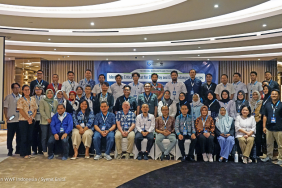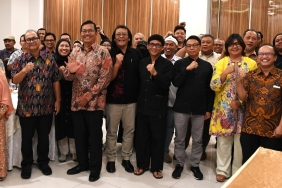NEW TECHNOLOGY REVEALS THE GLOBAL PATHWAYS OF MIGRATING LARGE MAMMALS THAT RULE THE SEAS
June 13, 2025 - A major breakthrough for the conservation of whales, the placental marine mammal, is BlueCorridors.org. This is a digital platform to support online activities that combines three decades of global whale tracking data with information on marine threats and protection solutions. BlueCorridors.org is a collaboration between WWF and a global coalition of marine scientists, civil society, governments and technology innovators. Blue Corridors is a world first for digitally mapping the migratory pathways of the ocean's ruling large mammals and is publicly accessible to support science, policy and ocean protection efforts around the world.

BlueCorridors.org not only emphasizes the need for collaborative action to achieve all of these global goals and policy frameworks-especially the 30x30 targets-but also provides practical guidance that can be implemented.
Includes visualizations of satellite tracking data from more than 50 global research groups, including Oregon State University, University of California Santa Cruz, University of Southampton, and many others. These maps trace the key migration pathways that connect whales to critical breeding, feeding and socializing habitats throughout the ocean basin-routes that are important not only for whale survival, but also for the health of marine ecosystems.
.
However, this lifeline faces increasing threats. Despite decades of conservation efforts, seven of the 14 great whale species remain endangered or vulnerable, facing increasing risks from ship collisions, fishing gear entanglements, underwater noise, plastic pollution, and the accelerating impacts of climate change.
BlueCorridors.org offers a crucial and innovative solution: a powerful, interactive tool that combines whale migration data with multiple layers of marine threats and conservation priorities, to support protection efforts across national borders and across sectors.
"Blue corridors are not just migration routes, they are lifelines for these ocean giants and the ecosystems that depend on them," said Chris Johnson, WWF Global Lead for the Whale and Dolphin Protection Initiative. "This platform turns decades of science into a tool for action-showing when, where and how whales need to be protected in a fast-changing ocean."
"This is the future of conservation-open, collaborative and science-based," said Dr. Ryan Reisinger, co-leader of the initiative from the University of Southampton, UK. "By connecting threats and solutions, this platform supports smarter, coordinated marine planning across sectors and national boundaries."
BlueCorridors.org builds on the collaborative "Protecting Blue Corridors" report (2022) that first mapped whale migration globally and formulated targeted regional conservation actions-from the Eastern Pacific and Mediterranean Sea to the Southern Ocean. This new digital platform addresses the need for a science-based, publicly accessible ocean connectivity tool, with the publication of a collaborative, expert-reviewed methodology and design to be released by the end of 2025.

"This is more than a map - it's a movement," Johnson concluded. "By combining cutting-edge science, digital innovation and creative narratives, we're providing new opportunities for whales. This platform reflects a rare alignment between science, civil society and policy-working together to protect the ocean giants through transparency, data and shared commitment."
In Indonesia, conservation efforts for these marine mammals still face challenges despite its waters being an important migration route for many large whale species. Some areas such as the Sawu Sea, Alor Waters, Banda Sea, South Bali, Wakatobi Waters are known as important resting, foraging and migrating habitats for sperm whales, pygmy blue whales and fin whales. However, shipping activities, unselective fishing and underwater noise continue to threaten the existence of these marine mammals.
Director of Species and Genetic Conservation, DG Marine Management, Ministry of Marine Affairs and Fisheries (KKP), Sarmintohadi, S.Pi, M.Si said "The BlueCorridors.org platform strengthens global efforts to protect migratory marine species by providing open and reliable scientific data. For Indonesia, this is an important breakthrough to strengthen evidence-based conservation policies, especially in the management of whales and other marine mammals that cross our waters. International collaborations like this are essential for integrated and transboundary species protection."
Ranny R. Yuneni, National Coordinator for WWF-Indonesia's Protected and Endangered Marine Species Program, also said ""BlueCorridors.org is the link between collaborative science and action on the ground. As part of this initiative, WWF-Indonesia continues to promote the conservation of cetacea through the mapping of critical habitats, the implementation of mitigation measures against various threats, and the development of conservation areas based on Cetacea or groups of ocean-dwelling mammals. Support is also provided in the development and implementation of the National Action Plan (NAP) for the protection of Ccetacea in Indonesia."
- DONE -
Documentation:
https://drive.google.com/drive/folders/1ivW1Nrr_jXCNo7tkntOirBjrgfKPetCu?usp=sharing
For more information:
Karina Lestiarsi, Communication Officer WWF Indonesia Foundation | klestiarsi@wwf.id
About WWF-Indonesia
The WWF Indonesia Foundation is an Indonesian incorporated civil society organization engaged in nature conservation and sustainable development, with the support of more than 100,000 supporters. WWF Indonesia Foundation's mission is to halt environmental degradation and build a future where people live in harmony with nature, through the conservation of the world's biodiversity, the sustainable use of renewable natural resources, and support for the reduction of pollution and overconsumption. For the latest news, visit www.wwf.id and follow us on X (Twitter) @WWF_ID | Instagram @wwf_id | Facebook WWF-Indonesia | Youtube WWF-Indonesia
About the Blue Corridors Initiative
Protecting Blue Corridors is a collaborative initiative engaging a community of scientists and marine mammal conservationists to visualize the growing risks to whales and identify solutions for ocean connectivity conservation to support science-based policy.
A core governance team comprised of the world's leading science and conservation organizations oversees the initiative, including data management, transparency, and platform development.
BlueCorridors.org. Team
Dr Rochelle Constantine (University of Auckland, New Zealand), Dr Violaine Dulau (Globice, Reunion Island), Dr Ari Friedlaender (University of California, Santa Cruz, USA), Chris Johnson (WWF), Dr Daniel Palacios (Oregon State University/Center for Coastal Studies, USA), Dr Simone Panigada (Tethys Research Institute, Italy), Dr Rui Prieto (University of Azores), Dr Ryan Reisinger (University of Southampton, UK), Dr Els Vermeulen (University of Pretoria, South Africa), and Dr Alex Zerbini (University of Washington, USA).
Website: https://bluecorridors.org
Contributing Researcher
Dr Olivier Adam (Sorbonne University, France); Dr Virginia Andrews-Goff (Australian Antarctic Program); Dr Artur Andriolo (Instituto Aqualie, Brazil); Dr Marie-Anne Blanchet (Norwegian Polar Institute); Dr Natalia Botero Acosta (Fundación Macuáticos, Colombia); Dr Gill Braulik (IUCN); Dr Emma Carroll (University of Auckland - Aotearoa New Zealand); Dr Salvatore Cerchio (African Aquatic Conservation Fund, USA/Senegal); Dr Mariano Coscarella (CONICET Argentina); Dr Tim Collins (Wildlife Conservation Society); Dr Solène Derville (French IRD, New Caledonia); Valeria Falabella (WCS, Argentina); Dr Steven Ferguson (DFO Canada); Dr Sabrina Fossette (Megaptera, Australia); Dr Claire Garrigue (Operation Cétacés, New Caledonia); Dr Raul Gonzalez (Universidad Nacional del Comahue, Argentina); Dr. Rob Harcourt (Macquarie University, Australia); Dr. Mads Peter Heide-Jørgensen (Greenland Institute of Natural Resources); Dr. Helena Herr (University of Hamburg, Germany); Erich Hoyt (IUCN SSC-WCPA Task Force, UK); Prof. Dr. Kit Kovacs (Norwegian Polytechnic). Kit Kovacs (Norwegian Polar Institute); Dr Véronique Lesage (DFO Canada); Dr Christian Lydersen (Norwegian Polar Institute); Dr Gianna Minton (IUCN SSC-WCPA, Netherlands); Dr Giuseppe Notarbartolo di Sciara (IUCN SSC-WCPA, Italy); Dr. Viola Panigada (Duke University, USA); Dr Christian Ramp (University of St Andrews, UK); Dr Leena Riekkola (University of Auckland); Dr Audun Rikardsen (UiT Norway); Dr Howard Rosenbaum (WCS, USA); Dr Anjara Saloma (Cétamada, Madagascar); S. Mduduzi Seakamela (DFFE, South Africa); Maia Sarrouf Willson (Environment Society of Oman); Dr Maritza Sepúlveda (Universidad Valparaíso, Chile); Greg Schorr (Marine Ecology and Telemetry Research, USA); Dr Mariano Sironi (Instituto de Conservación de Ballenas, Argentina); Dr Kate Sprogis (University of Western Australia); Dr Laurène Trudelle (Université Paris-Saclay, France); Dr Marcela Uhart (University of California Davis, USA/Argentina); Dr Michel Vely (MEGAPTERA, France); Dr Andrew Willson (Future Seas, Oman); and Josh Wilson (University of Southampton, UK).
Data Curation and Analysis
The Ocean Predator Ecology Lab at the University of Southampton examines how environmental factors and human activities influence the behavior and distribution of marine predators. Using a range of tools such as biologging, remote sensing, stable isotope analysis, machine learning and network analysis, the lab supports marine conservation and ecosystem management.
Website: https://beacons.ai/opelresearch
Technology Partner - Ode
Ode is a group of scientists, strategists, designers, and engineers with years of experience at organizations like NASA, the White House, and Google X. The Ode team brings deep expertise in data management, design, and a wide range of climate sectors, from food and agriculture to earth observation.
Website: https://ode.partners/en
Project Coordination
WWWF's Protecting Whales & Dolphins Initiative is a global conservation program that brings science, policy and partnerships together to co-design solutions that reduce threats, protect critical habitats and ensure healthy, sustainable cetacean populations.
Website: https://wwfwhales.org





